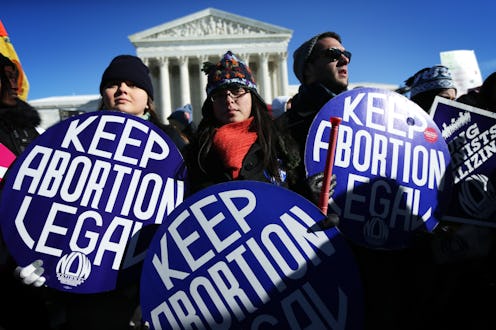News
If Trump Stops Undocumented Teen's Abortion, Her Child Will Be A U.S. Citizen

A pregnant, undocumented minor is currently in a detention facility in Texas, and the Trump administration is doing everything in its power to prevent her from having an abortion. A judge initially granted the anonymous 17-year-old (identified as "Jane Doe" in the lawsuit) the right to temporarily leave the facility to have an abortion on Saturday, but the Justice Department fought to appeal that decision, and succeeded — at least, temporarily. Doe now faces an uncertain future, and the case raises important questions about the legal rights of undocumented minors seeking abortions in the United States.
One thing is clear: If Doe gives birth, and does so in the United States, her child will be an American citizen. That's thanks to the Constitution's 14th Amendment, which states that "all persons born or naturalized in the United States, and subject to the jurisdiction thereof, are citizens of the United States and of the state wherein they reside."
But Doe herself wouldn't automatically become a U.S. citizen in this scenario. That's the "anchor baby" myth, and it's just that — a myth. Non-citizens who give birth in the United States don't automatically become citizens themselves. That's simply not a thing, and never has been.
"Unfortunately, under our immigration laws, being the parent of a U.S. citizen child confers no automatic right to lawful status or citizenship," Alisa Wellek, executive director of the Immigrant Defense Project, tells Bustle. "In fact, hundreds of thousands of parents of U.S. citizen children are deported every year."
U.S. citizens with undocumented parents do have the option of applying for a green card and visa on their parent's behalf. But they aren't allowed to even begin this process until they — that is, the children — are 21 years old. So, that's a 21-year wait. The application process itself, as outlined in the Immigration and Nationality Act, is lengthy and complicated, and even when it's completed, there's no guarantee that the government will grant the application.
Doe crossed the border in September, and has been detained in a Texas facility ever since. After a medical exam determined that she was pregnant, she attempted to seek an abortion; Texas law requires minors to receive permission from either a state judge or their parents in order to have an abortion, and a state judge granted Doe permission to do so. However, officials from the Department of Health and Human Services, which has jurisdiction over undocumented minors, haven't allowed her to leave the detention facility in order to undergo the procedure — although they did let her leave the facility to receive "counseling" from a Christian group that seeks to convince pregnant women not to have abortions.
On Wednesday, U.S. District Judge Tanya S. Chutkan ordered that Doe be allowed to leave the detention facility and have an abortion by Saturday night. Lawyers for the Trump administration claimed in court filings that the U.S. government has a "strong and constitutionally legitimate interests in promoting childbirth," and argued in court that Doe doesn't have a constitutional right to an abortion because she is not a U.S. citizen. According to the Washington Post, Chutkan laughed when she heard that, and said she was "astounded" by the federal government's "remarkable" position on the constitutional rights of undocumented citizens.
Although Chutkan ruled in favor of Doe, Attorney General Jeff Sessions immediately appealed that decision, and on Thursday morning, an appeals court placed a temporary injunction against Chutkan's earlier ruling. In effect, this means Doe will be confined to the detention facility she's in until at least Friday, when a three-judge panel will make a final ruling on the case.
“This administration has no shame and no regard for a woman’s health or decisions," said Brigitte Amiri, senior staff attorney with the ACLU Reproductive Freedom Project, in a statement. "Weeks ago, our client decided to end her pregnancy. Her decision has been disregarded and she's now been dragged into a protracted legal battle over her ability to get the care she needs. The abuse of power is appalling.”